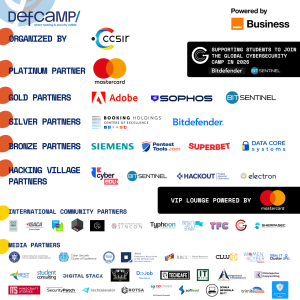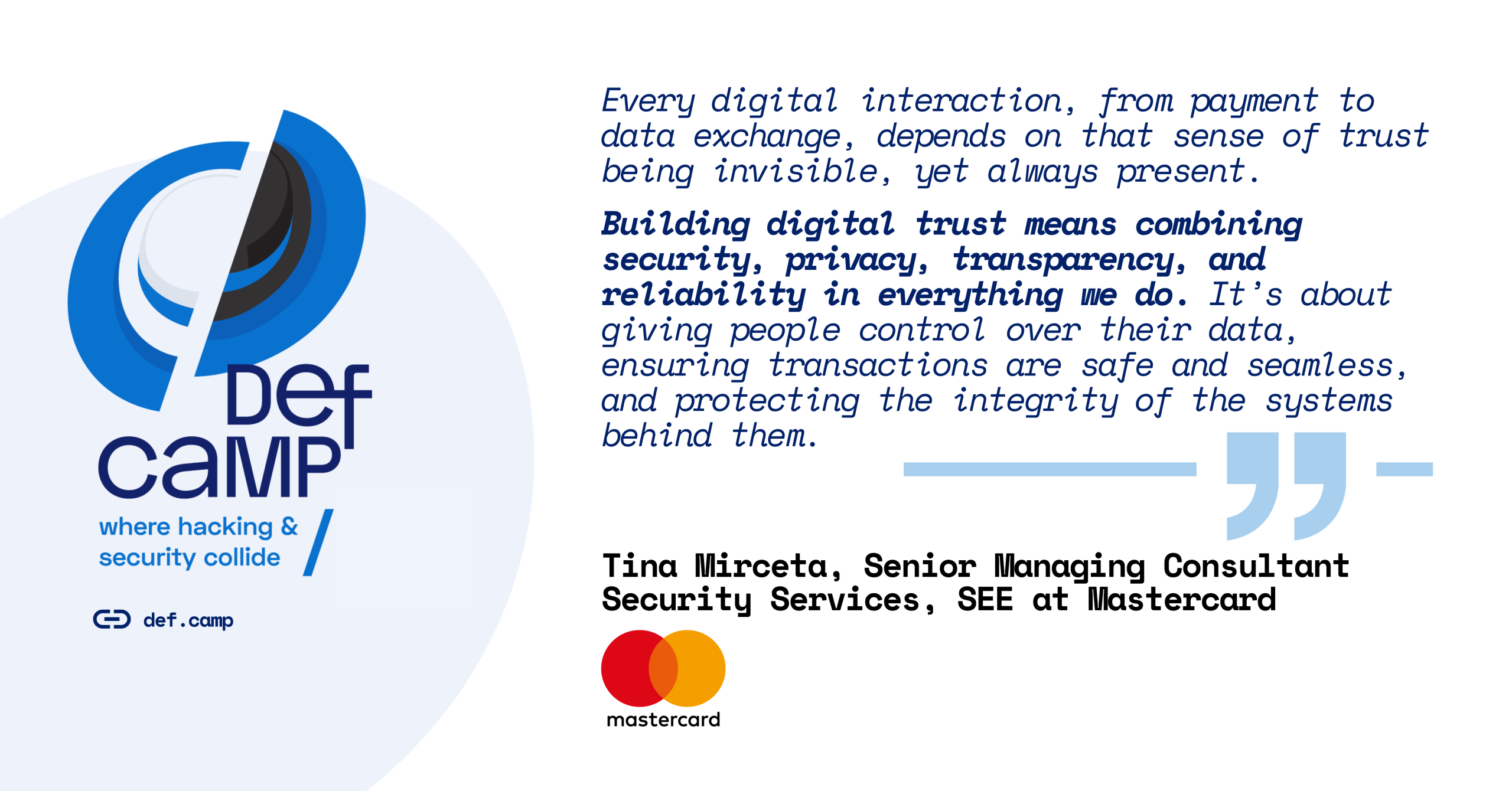Cyber threats are evolving at an unprecedented pace, making collaboration, innovation, and resilience more essential than ever.
In this exclusive interview, we sit down with Tina Mirceta, Senior Managing Consultant, Security Services, SEE at Mastercard, to discuss how the cybersecurity landscape is transforming and what organizations can do to stay ahead of increasingly complex attacks. From the rise of AI-driven fraud and global ransomware operations to Mastercard’s initiatives supporting cyber resilience across Europe, Tina offers deep insights into the company’s mission to make digital trust the cornerstone of the modern economy.
Throughout the conversation, we explore how Mastercard leverages cutting-edge intelligence, public-private partnerships, and education programs, empowering businesses of all sizes to thrive securely in the digital age.
The cybersecurity landscape is constantly evolving. From your perspective, how have cyber threats and fraud patterns changed in recent years, and what challenges do organizations face in staying ahead of them?
The cybersecurity landscape has become increasingly complex over the past few years, driven by the rise of digital transformation, remote work, and the growing sophistication of threat actors. We’re seeing a shift from isolated attacks to well-coordinated, large-scale operations, including ransomware-as-a-service, supply chain compromises, and AI-driven phishing schemes that are harder to detect and mitigate. According to our data, the global cost of cybercrime is expected to reach 15.6 trillion dollars by 2029, which illustrates not only the financial magnitude of the problem but also the urgent need for stronger, proactive defenses.
For organizations, one of the biggest challenges is maintaining visibility and resilience across increasingly interconnected ecosystems, especially when managing third-party risks and ensuring consistent compliance. The speed of technological innovation often outpaces the ability of many businesses to secure new systems effectively. At Mastercard, we focus on a layered approach, combining advanced fraud intelligence, AI-driven monitoring, and continuous education, to help clients stay ahead of emerging threats while building long-term trust in the digital economy.
Fraud has become increasingly complex, blending social engineering, AI, and advanced attack methods. How is Mastercard helping organizations and consumers navigate this growing sophistication in cybercrime?
At Mastercard, we see fraud prevention as an evolving partnership between technology, intelligence, and people. As cybercriminals become more sophisticated, we’re matching that with innovation, data, and collaboration across the ecosystem. We’ve built a multilayered approach that combines real-time intelligence, behavioral analytics, and AI-driven detection to identify and stop threats before they cause harm. Our Security Solutions business unit continuously monitors global transaction patterns and risk signals to protect both organizations and consumers at scale.
The acquisition of Recorded Future, the world’s largest intelligence platform for enterprise security, takes this a step further, helping businesses connect the dots across millions of data sources to anticipate emerging threats rather than react to them. But beyond technology, we believe education and collaboration are key. That’s why Mastercard works closely with banks, fintechs, governments, and law enforcement to share actionable insights, raise awareness of social engineering scams, and strengthen collective resilience.
In short, our goal is to make security invisible but always active, so people can trust every interaction, and organizations can innovate with confidence.
Mastercard has developed several strategic initiatives to enhance resilience, such as the Cyber Resilience Center. Could you tell us more about its mission and the kind of support it offers to partners and clients?
The European Cyber Resilience Centre, which we opened in 2024 at our European Headquarters, is a key milestone in Mastercard’s commitment to strengthening cybersecurity across the region. Its mission is to help organizations protect, detect, and respond to cyber threats more effectively by fostering deep collaboration between the public and private sectors. The Centre brings together experts from more than 20 Mastercard teams, including our Fusion Centre, the heart of our global incident response, and a dedicated Digital Forensics Lab. Together, these teams work side by side to identify emerging threats, share intelligence, and coordinate responses in real time.
Beyond Mastercard, the Centre also serves as a collaboration hub for national cyber intelligence agencies, law enforcement, and industry partners across Europe. This ecosystem approach ensures faster response times, stronger defenses, and greater resilience for the organizations we work with. Ultimately, the Centre reflects our broader mission: to power economies and empower people by making every digital interaction simple, safe, and secure.
The Strive program is an inspiring example of supporting small and medium-sized businesses in their digital journey. Can you share how cybersecurity plays a role within this initiative, and perhaps highlight the outcomes from the recent bootcamp in Bucharest?
Cybersecurity is a core pillar of the Mastercard Strive EU program, because small and medium-sized businesses can only grow sustainably if they’re protected in the digital world. Many of these businesses are embracing digital tools for the first time and helping them build resilience against cyber threats is essential to their success.
Earlier this year, we hosted a venture-building bootcamp in Bucharest for Romanian SMEs that had applied last year to the Strive EU Innovation Fund. The event brought together entrepreneurs, mentors, and ecosystem partners to explore how digital transformation and cybersecurity can work hand in hand to unlock growth. Two innovative Romanian startups, Fagura and Idea Morph, were selected as winners of the Strive EU Innovation Fund, each receiving grants of €75,000 and tailored mentorship to further develop their solutions. Both projects use data-driven and AI-powered tools to help small businesses access financing securely and digitalize responsibly, with cybersecurity built into their core.
Through Mastercard Strive EU, supported by the Mastercard Center for Inclusive Growth, we aim to empower millions of small businesses across Europe to digitalize safely, adopt emerging technologies like AI, and strengthen their resilience in a rapidly evolving economy.
Mastercard recently announced a new cyber program for SMEs. What are its main goals, and how does it address the unique challenges that smaller businesses face when it comes to cyber resilience?
Supporting small and medium-sized businesses has always been central to Mastercard’s mission, because they are the backbone of Europe’s economy, yet often the most vulnerable when it comes to cyber threats. That’s why we commit to launching a free cybersecurity education program that will reach more than 10 million European SMEs, helping them strengthen their digital defenses and build long-term resilience. The program focuses on awareness, education, and practical tools that enable smaller businesses to understand, prevent, and respond to cyber risks. We aim to make cybersecurity part of everyday business operations, not an afterthought.
We’re also developing a lighthouse innovation program in Belgium to accelerate startup-led solutions that help SMEs adopt secure digital tools and navigate emerging technologies. This initiative reflects Mastercard’s broader commitment to trust and innovation in Europe’s digital economy, ensuring that every business, regardless of size, can thrive securely and confidently in the digital age.
Building digital trust is essential in today’s economy. What does “digital trust” mean to Mastercard, and how do you see it influencing the future of secure digital interactions?
For Mastercard, digital trust is the foundation of the modern economy, it’s what allows people, businesses, and institutions to connect, transact, and innovate with confidence. Every digital interaction, from payment to data exchange, depends on that sense of trust being invisible, yet always present. Building digital trust means combining security, privacy, transparency, and reliability in everything we do. It’s about giving people control over their data, ensuring transactions are safe and seamless, and protecting the integrity of the systems behind them.
We see digital trust as a shared responsibility, strengthened through collaboration with partners, regulators, and the cybersecurity community. That’s why we continue to invest in AI-driven fraud prevention, advanced identity solutions, and real-time threat intelligence.
Looking ahead, digital trust will be the differentiator that shapes the future of secure digital interactions. The more people trust the systems they use, the more they’ll participate in the digital economy, and that’s how innovation truly scales.
Resilience is not just about technology: it’s also about people and culture. How can companies, regardless of size, foster a mindset of cyber resilience within their teams?
I believe that resilience begins with mindset, with every employee understanding that they play a role in protecting the ecosystem. For any organization, the first step is to create a culture where cybersecurity feels shared, not siloed. That means giving teams the right knowledge, tools, and confidence to act – through regular learning, scenario exercises, and open conversations about risk.
Resilient companies also lead by example, encouraging cross-functional collaboration and integrating security thinking into every
day business decisions. In the end, resilience isn’t a one-time investment, it’s a habit. The more we embed it into our culture, the stronger and more adaptive we become.

This year, Mastercard is present at DefCamp, a leading hub for cybersecurity professionals in the region. What motivated Mastercard to join this community, and what key messages or experiences are you hoping to share here?
Events like DefCamp remind us that real progress in cybersecurity is driven by openness, curiosity, and collaboration. It brings together some of the brightest minds in the field – experts who challenge each other, share ideas, and shape the future of digital security.
For Mastercard, joining this community was a natural choice. Cybersecurity sits at the core of everything we do, and DefCamp offers the perfect environment to exchange knowledge, explore new perspectives, and share best practices. Our goal is to contribute to this collective dialogue by sharing our experience in areas such as threat intelligence, AI-driven fraud prevention, and cyber resilience, while also inspiring meaningful conversations about how we can work together to build a safer, more trusted digital future.
As Tina highlights, cybersecurity is about people, collaboration, and trust. Mastercard’s commitment to building a safer digital ecosystem is reflected in its continuous investment in innovation, education, and partnership.
At DefCamp 2025, Mastercard joins the community as Platinum Partner and VIP Lounge Partner, reinforcing its dedication to advancing the cybersecurity conversation. You’ll find the Mastercard team in the relaxation area as well, where they’ve created a cozy space for you to take a break, recharge, and chat with the experts shaping the future of secure digital interactions.
Drop by, meet the team, and be part of the movement to make the digital world more trusted, resilient, and secure!

